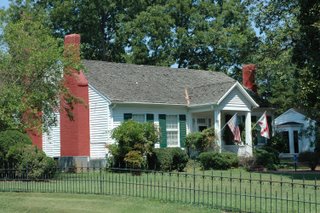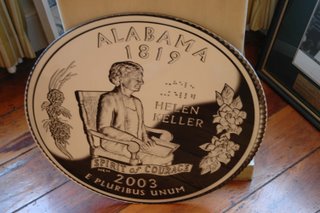
The town of Tuscumbia is pretty, historic little burg. A cold spring flows in the town park, a tribute to the wife of Chief Tuscumbia, for whom the town is named. Fanciful Ionic capitals grace the columns of the county courthouse, and the brick facades are filled with restaurants serving blue-plate specials to grilled chicken on foccacio.
Helen Keller likely never saw any of it. She became blind following an illness at age 19 months. But thanks to her own brilliance, the indulgence and wealth of her parents and the doggedness of her teacher Anne Sullivan, the blind-deaf Keller did more to advance the cause of people with disabilities than anyone in history.
Her birthplace was here, in Tuscumbia, in northwestern Alabama, at her family home of Ivy Green. Today it’s a museum.
A woman named Mary Eubanks – she lived in Miami for a year when she was 12 – showed me around, pointing out the photographic portraits of the Keller family, the furniture (85 percent of it is original), the lacy Victorian garments Helen Keller wore as a young girl, and what’s left of the family china. (Keller smashed much of it in tempestuous rages as a small child, before she learned to communicate in Braille and later, to write.)
By today’s standards, the wooden house isn’t posh, but it was the home of privilege. Keller's ancestors included a Colonial governor of Virginia and President John Quincy Adams, and her father, a Civil War veteran, owned the local newspaper.
“If her family had been poor, they would have put her away,’’ says Eubanks. “It would have been such a shame.’’
Keller’s transformation was memorialized in The Miracle Worker – a play and then movie with Anne Bancroft and Patty Duke. If you’ve never seen, rent it ASAP.
Keller’s father wrote to inventor Alexander Graham Bell for help, who recommended getting a teacher from a school for the deaf. Anne Sullivan was that teacher. When Keller’s parent’s refused to discipline the child, Sullivan took Helen “away’’ – on a two-hour carriage ride that ended in the white cottage next door to the Keller family home. There, the brilliant child learned to spell and then, to put meaning to words. She became the first deaf student at the vaunted Radcliffe College, and then a lecturer and author of 14 books. Keller died in 1968 at the age of 88.
A visit here is study in tenacity and courage: Of Keller’s parents, her teacher, herself. It’s a reminder that it’s not the circumstances life dishes out but how you approach them that shapes who you are.
Thursday, August 24, 2006
Helen Keller's courage
Posted by
DARCOS CRUZ
at
6:45 PM
![]()
![]()
Subscribe to:
Post Comments (Atom)


5 comments:
The movie was on PBS a few weeks ago.It is timeless in showing how education and discipline will open doors to the world. Perhaps it should be a requirementfor M-DCPS students......
The movie was on PBS a few weeks ago.It is timeless in showing how education and discipline will open doors to the world. Perhaps it should be a requirementfor M-DCPS students......
The movie was on PBS a few weeks ago.It is timeless in showing how education and discipline will open doors to the world. Perhaps it should be a requirementfor M-DCPS students......
The movie was on PBS a few weeks ago.It is timeless in showing how education and discipline will open doors to the world. Perhaps it should be a requirementfor M-DCPS students......
The movie was on PBS a few weeks ago.It is timeless in showing how education and discipline will open doors to the world. Perhaps it should be a requirementfor M-DCPS students......
Post a Comment